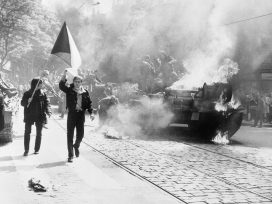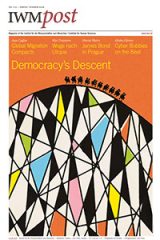

In collaboration with
Institute for Human Sciences
The Institute for Human Sciences / Institut für die Wissenschaften vom Menschen (IWM) is an independent institute for advanced study in the humanities and social sciences. Since its foundation in 1982, it has hosted more than 1500 scholars, journalists and translators from all over the world. Many of the Institute’s Permanent and Visiting Fellows are regular contributors to Eurozine or its focal points The World in Pieces and Ukraine in European Dialogue (see below).
Website: www.iwm.at
X (formerly known as Twitter): https://x.com/iwm_vienna
Youtube: https://www.youtube.com/channel/UCIwFQ_iRX8w8D0NKJo41Ihw

Articles

Parallels between May ’68 and the Prague Spring are largely the result of the simultaneity of the events; in important respects, the political goals of the two movements were antithetical. Nevertheless, central European dissent had a significant impact on the French anti-totalitarian Left after 1968, argues Jacques Rupnik.
Not an island
Europe and the Middle East
An arms race in the Middle East would affect European security to an unimaginable degree, says Joschka Fischer. By drawing on its positive experience in conflict resolution, Europe can play a major role in averting such a development. But does it have the instruments and institutions to do so? Given the urgency of the situation in Middle East, can Europeans afford the luxury of being against Europe?
From "big character posters" to blogs
Facets of independent self-expression in China
Despite predictions to the contrary, the Internet has not brought about abrupt political change in China and is not likely to do so anytime soon. Its significance and implications for Chinese society lie elsewhere, writes Martin Hala.
Right turn
Polish politics at the beginning of the twenty-first century
The “shock tactics” to which the Polish economy was subjected during the 1990s have discredited liberalism as a political movement in the country. Over the last five years, Poland’s two major rightwing parties have come to dominate the political landscape. Their anti-communism, national conservatism, and distrust of “moral relativism” find ample support among the electorate. The Centre-Left, meanwhile, tarnished by corruption scandals, fails to offer convincing alternatives. With re-elections set for 21 October, it seems unlikely that Poland will alter its political course rightwards.
Focal points

Inspired by a lecture that Clifford Geertz delivered in 1995 at the Institute for Human Sciences in Vienna, this focal point engages with ‘deep diversity’, ‘a sense of dispersion, of particularity, of complexity and of uncenteredness’ rather than unified world order. It follows the launch of a research programme of the same name at the institute in January 2023.

Post-revolutionary Ukrainian society displays a unique mix of hope, enthusiasm, social creativity, collective trauma of war, radicalism and disillusionment. With the Maidan becoming history, the focal point ‘Ukraine in European Dialogue’ explores the new challenges facing the young democracy, its place in Europe, and the lessons it might offer for the future of the European project.
Projects and publications

